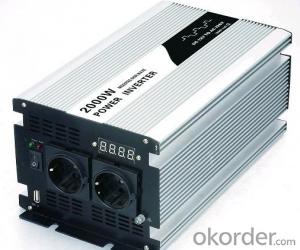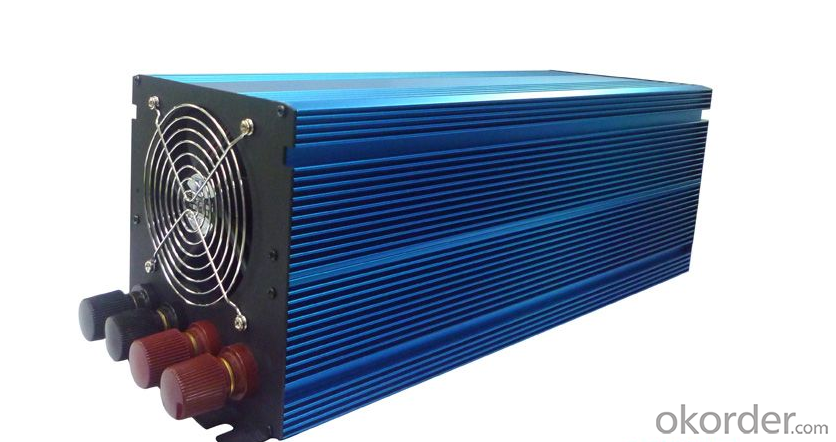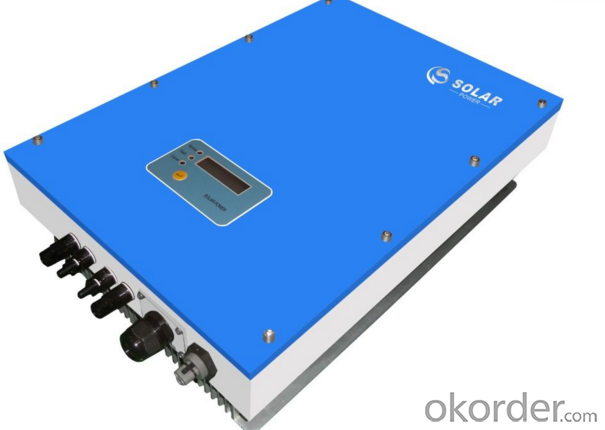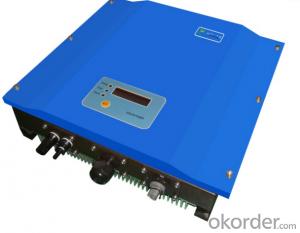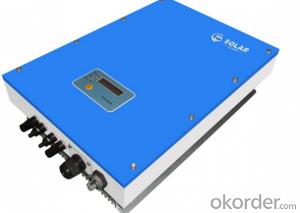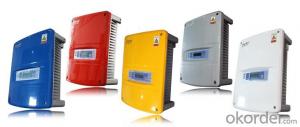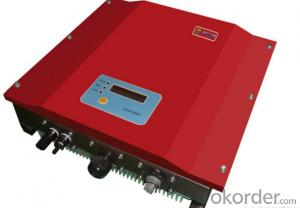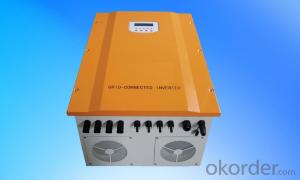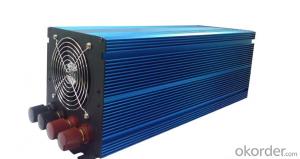Three Phase 10k Solar Inverter made in China
- Loading Port:
- Shanghai
- Payment Terms:
- TT OR LC
- Min Order Qty:
- 0 watt
- Supply Capability:
- 10000 watt/month
OKorder Service Pledge
OKorder Financial Service
You Might Also Like
Description of Three Phase 10k Solar Inverter
Solar ac power system consists of solar panels, charge controllers, inverter and battery; Solar energy does not include inverter dc power system. Inverter is a kind of power conversion device, inverter by incentives can be divided into self-excited oscillation inverter and separately excited oscillation inverter.
Features of Three Phase 10k Solar Inverter
Standard 10 years warranty, 5-15 years optional
Built-in Gprs as option
Built-in Wifi as option
External Inductor
Smaller and lighter, only 22kg
High performance DSP for algorithm control
VDE-AR-N 4105 certification
New topology design
Dual MPPT design
IP65 waterproof and dustproof level
Multi-button touch interface
LCD screen visible at night
Have anti-shading function
Advantages of Three Phase 10k Solar Inverter
Longer life cycle
Plug and play
Free monitoring through our webportal
Very lower internal temperature
Easy transportation and installation
Faster CPU speed
Adjustable active and reactive power
Maximum conversion effciency up to 97.6%,Euro up to 96.8%
More flexible system design
Maximized system profit
User friendly operation
24 hour operation data readable on screen
Suitable to complex installation environment
Technical Data of Three Phase 10k Solar Inverter
| Type | Omniksol-10k-TL2 |
| Input(DC) | |
| Max.PV Power | 10000W |
| Max,DC Voltage | 1000V |
| Nominal DC Voltage | 640V |
| Operating MPPT Voltage Range | 150-800V |
| MPPT Voltage Range at Nominal Power | 360-800V |
| Start up DC Voltage | 250V |
| Turn off DC Voltage | 150V |
| Max, DC Current(A/B) | 14A/14A |
| Max, Short Cicuit Current for each MPPT | 20A/20A |
| Number of MPP trackers | 2 |
| Max, Input Power for each MPPT* | 5000W |
| Number of DC Connection | A:2/B:2 |
| DC Connection Type | MC4 connector |
| Output(AC) | |
| Max,AC Apparent Power | 8200VA |
| Nominal AC Power (cos phi = 1) | 8200W |
| Nominal AC Current | 11.9A |
| Nominal AC Voltage | 3/N/PE;220/380V |
| 3/N/PE;230/400V | |
| 3/N/PE;240/415V | |
| Nominal Grid Frequency | 50Hz/60Hz |
| Max, AC Current | 13.9A |
| Grid Voltage Range** | 185-276V |
| Grid Frequency Range** | 45-55Hz/55-65Hz |
| Power Factor | 0.9 capacitive... 0.9 inductive |
| Total Harmonic Distortion(THD) | <2% |
| Feed in Starting Power | 30W |
| Night time Power Consumption | <1W |
| Standby Consumption | <10W |
| AC Connection Type | Plug-in connertor |
| Efficiency | |
| Max,Efficiency | 97.6% |
| Euro Efficiency | 96.8% |
| MPPT Efficiency | 99.9% |
| Safety and Protection | |
| DC Insulation Monitoring | Yes |
| DC Switch | Optional |
| Residual Current Monitoring Unit (RCMU) | Integrated |
| Grid Monitoring with Anti-islanding | Yes |
| Electricity Fuse Protection | Yes |
| Protection Class | Ⅰ(According to IEC 62103) |
| Overvoltage Category | Ⅲ(According to IEC 62109-1) |
| Reference Standard | |
| Safety Standard | EN 62109, AS/NZS 3100 |
| EMC Standard | EN 6100-6-1, EN 6100-6-2, EN 6100-6-3 EN 6100-6-4, EN 6100-3-2, EN 6100-3-3 |
| Grid Standard | VDE-AR-N4105. VDE-0126-1-1,G83/1,EN 50438,RD1699,CEI 0-21, AS4777,C10/C11 |
| Physical Structure | |
| Dimensions | 352x421x172.5mm |
| Weight | 22kg |
| Environmental Protection Rating | IP 65 (According to IEC 60529) |
| Cooling Concept | Natural convection |
| Mounting Information | Wall bracket |
| General Data | |
| Operating Temperature Range | -25℃ to +60℃(derating above 45℃) |
| Relative Humidity | 0% to 98%, no condensation |
| Max. Altitude (above sea level) | 2000m |
| Noise Type | <40dB |
| Isolation Type | Transformerless |
| Display | 20 x 4 LCD (800x480 TFT Graphic Display optional) |
| Data Communication | RS485(WiFi, GRPS optional) |
| Computer Communication | USB |
| Standard Warranty | 10 Years (5-15 years optional) |
IMages of Three Phase 10k Solar Inverter
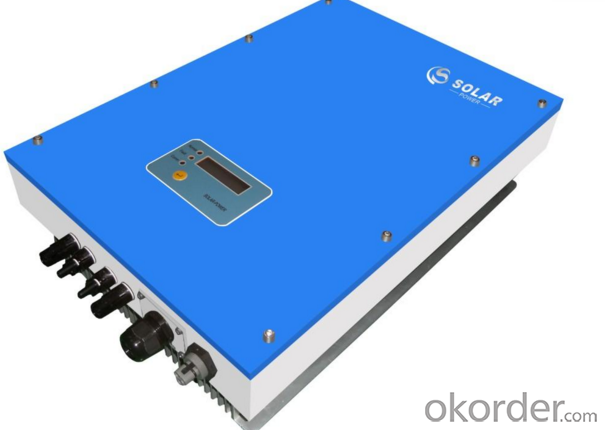
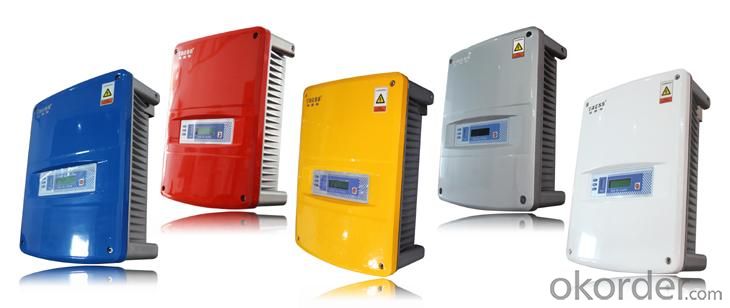
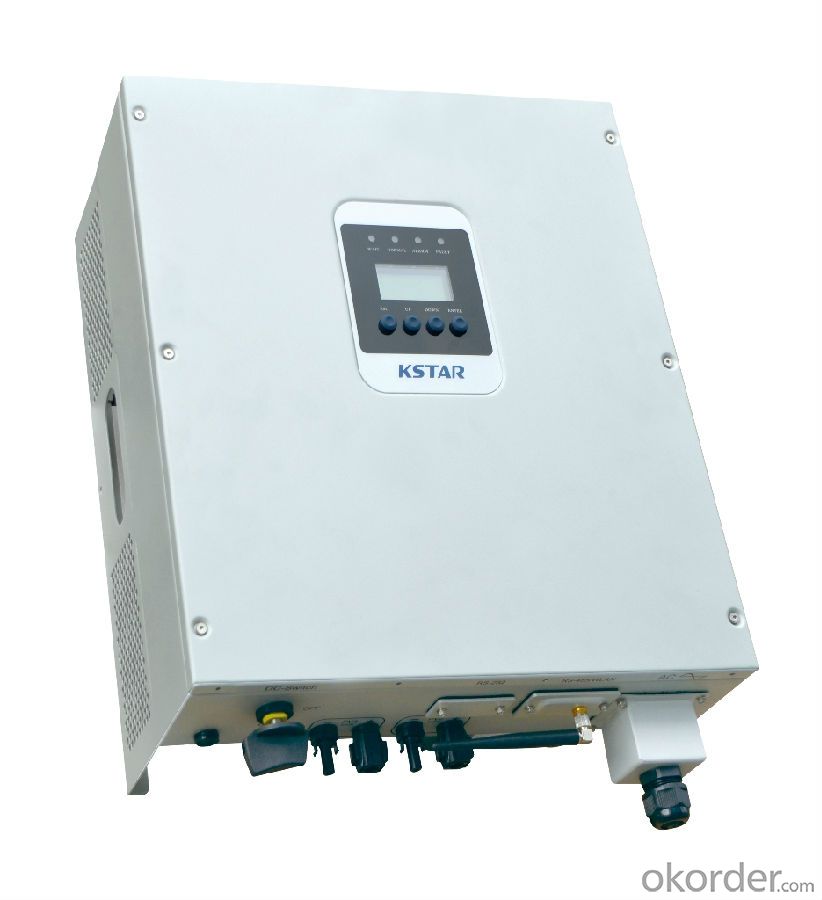
FAQ
Q: Do you have the CE, TUV, UL Certification?
A: We’ve already passed all the tests, and any certificate is available.
Q: Have you ever sold your products to companies in my country?
A: Of course, we have customers in all general PV markets, but I think we should expand our market share along with the market growth.
Q: When did your company set up? You are a new company, how can I believe your quality?
A: We entered into Solar PV industry in 2005, now we have several plants in manufacturing of a-Si and c-Si panels, and our capacity is 220MW per year. Till now we have already passed all the tests by authorized laboratories, e.g. TUV, CE, UL.
Q: Can you help us install the module if we cooperate with you?
A: We haven’t entered into installation sector, but we have the plan in near future.
Q: How do you pack your products?
A: We have rich experience on how to pack the panels to make sure the safety on shipment when it arrives at the destination.
Q: Can you do OEM for us?
A: Yes, we can.
Q: Can we visit your factory?
A: Surely, I will arrange the trip basing on your business schedule.
- Q: Can a solar inverter be used in grid-tied systems?
- Yes, a solar inverter can be used in grid-tied systems. In fact, it is a crucial component of such systems as it converts the DC power generated by solar panels into AC power that can be fed into the electrical grid.
- Q: How does a solar inverter handle voltage dips or fluctuations in the grid?
- A solar inverter handles voltage dips or fluctuations in the grid by constantly monitoring the grid voltage. When it detects a dip or fluctuation, it rapidly adjusts its output voltage to stabilize the grid voltage. This process is known as grid support or grid-tied operation and ensures that the solar inverter maintains a steady and synchronized connection with the grid, even during voltage disturbances.
- Q: Can a solar inverter be used with a solar-powered electric gate system?
- Yes, a solar inverter can be used with a solar-powered electric gate system. The solar inverter converts the direct current (DC) generated by the solar panels into alternating current (AC) that is required to power the electric gate system. This allows the solar energy captured by the solar panels to be utilized effectively in operating the electric gate system.
- Q: Are solar inverters weather-resistant?
- Yes, solar inverters are typically weather-resistant. They are designed to withstand different weather conditions such as rain, snow, and extreme temperatures. However, it is still important to consider proper installation and maintenance to ensure the longevity and performance of the inverter in varying weather conditions.
- Q: How does a solar inverter handle grid islanding conditions?
- A solar inverter detects grid islanding conditions by monitoring the voltage and frequency of the grid. When it detects a deviation from the normal range, indicating an islanding event, it immediately stops supplying power to the grid. This is done to ensure the safety of utility workers who may be repairing the grid.
- Q: What is the role of a solar inverter in a grid-tied system?
- The role of a solar inverter in a grid-tied system is to convert the direct current (DC) electricity generated by the solar panels into alternating current (AC) electricity that can be used to power electrical appliances and be fed back into the utility grid. It also ensures the synchronization of the solar system with the grid and regulates the voltage and frequency of the electricity being produced.
- Q: How does the input voltage range affect the performance of a solar inverter?
- The input voltage range directly affects the performance of a solar inverter. If the input voltage falls below the minimum range, the inverter may not be able to convert the DC power from the solar panels into usable AC power efficiently or at all. On the other hand, if the input voltage exceeds the maximum range, it can potentially damage the inverter. Therefore, it is crucial to ensure that the input voltage remains within the specified range for optimal performance and longevity of the solar inverter.
- Q: How does a solar inverter handle voltage unbalance?
- A solar inverter handles voltage unbalance by continuously monitoring the phase voltages of the grid. If a voltage unbalance occurs, the inverter adjusts its output voltage and frequency to maintain a balanced supply to the grid. This ensures that the solar inverter can efficiently convert the DC power generated from the solar panels into AC power that is synchronized with the grid, despite any voltage imbalances.
- Q: What is the maximum power output of a solar inverter?
- The maximum power output of a solar inverter depends on its specifications and capacity. It can range from a few hundred watts to several megawatts, depending on the size and type of the solar inverter.
- Q: Can a solar inverter be used in areas with high electromagnetic radiation?
- Indeed, a solar inverter is suitable for use in regions with abundant electromagnetic radiation. Nonetheless, it is crucial to acknowledge that the inverter's performance and reliability could potentially be impacted by the presence of such radiation. The existence of elevated radiation levels has the potential to induce electromagnetic interference (EMI), thereby causing disruptions in the inverter's operation and leading to decreased efficiency or even complete failure. Consequently, it is highly recommended to adopt necessary precautions, including implementing proper grounding and shielding techniques, as well as selecting inverters equipped with robust EMI protection mechanisms when installing solar inverters in areas with high electromagnetic radiation. Furthermore, seeking guidance from experts or manufacturers who possess knowledge regarding specific solar inverter models designed to endure and excel in environments characterized by high electromagnetic radiation is strongly advised.
Send your message to us
Three Phase 10k Solar Inverter made in China
- Loading Port:
- Shanghai
- Payment Terms:
- TT OR LC
- Min Order Qty:
- 0 watt
- Supply Capability:
- 10000 watt/month
OKorder Service Pledge
OKorder Financial Service
Similar products
Hot products
Hot Searches
Related keywords
